#App Development Costs
Explore tagged Tumblr posts
Text
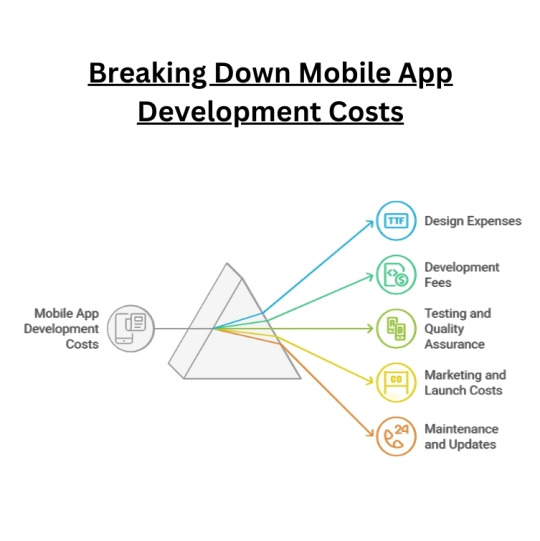
#Mobile App Development#App Development Costs#Tech Trends 2025#App Development Budgeting#Mobile Development#Tech Strategies#2025 Technology#Cost Calculation#Mobile App Pricing#App Development Insights
0 notes
Text
#app development cost#app development#mobile app development cost#mobile app development#app development outsourcing cost#cost of app development#software development#app development company#app development costs#future of ai app development#mobile app development cost estimate#app development cost breakdown#ai app development company#ai development company#app development estimate cost#how much app development cost#app development for startups
1 note
·
View note
Text
Hourly vs. Fixed Rates: Understanding Mobile App Development Costs

So you’ve got a fantastic mobile app idea and are eager to bring it to life. But before diving headfirst into development, a crucial question arises: how much will it cost? The answer, unfortunately, isn’t a simple one. Mobile app development costs can vary significantly depending on several factors, with two primary pricing models influencing the final figure: hourly rates and fixed rates.
Understanding the Mobile App Development Cost Model
Both hourly and fixed rate models have their pros and cons, making it essential to understand them before deciding which best suits your project.
Hourly Rates:
Flexibility: This model offers greater flexibility as you only pay for the development hours utilized. Ideal for projects with evolving requirements or unforeseen complexities.
Transparency: You have clear visibility into the development process and associated costs. Perfect if you’re budget-conscious and want to track progress closely.
Potential for Cost Overruns: Since costs are directly tied to development hours, unexpected challenges can lead to budget overruns.
Here’s a breakdown of factors affecting development time and, consequently, hourly costs:
App Complexity: Simple apps with basic features require fewer hours compared to feature-rich apps with complex functionalities like backend integrations, real-time features, or AI integration.
Developer Experience: Senior developers with extensive experience often command higher hourly rates, but their efficiency can offset the cost. Junior developers may offer lower rates but might require more time to develop specific functionalities.
Development Team Location: Hourly rates can vary significantly depending on the location of your development team. Rates tend to be higher in North America and Western Europe compared to Asia or Eastern Europe.
Fixed Rates:
Predictability: Fixed rates provide upfront cost certainty, allowing for better budgeting and financial planning.
Reduced Risk of Cost Overruns: The development team assumes the risk of exceeding estimated hours within the agreed-upon fixed price.
Limited Flexibility: Fixed rates offer less flexibility for changes or additions to the app’s scope after the project begins. Implementing significant changes might require renegotiating the contract.
Choosing the Right Model for Your Project
The best mobile app development cost model depends on your project’s specific needs and risk tolerance. Consider the following factors when making your decision:
Project Scope: For well-defined projects with clear requirements, fixed rates can be a good option. However, if your app idea is still evolving, hourly rates might offer better flexibility.
Budget: If you have a tight budget and require strict cost control, hourly rates allow for closer monitoring. However, fixed rates can provide peace of mind if you prioritize upfront cost certainty.
Risk Tolerance: Are you comfortable with potential cost overruns associated with hourly rates? Or do you prefer the predictability of a fixed price, even if it might limit flexibility?
Additional Considerations Beyond the Mobile App Development Cost Model
While pricing models are crucial, remember that cost isn’t the only factor. Here are some additional considerations:
Development Team Expertise: Choose a team with experience building apps similar to yours. A skilled team can deliver a robust app efficiently, even at a slightly higher rate.
Communication and Transparency: Ensure clear communication and regular updates from your development partner.
Project Management: Effective project management minimizes delays and keeps costs under control.
How Prometteur Can Help You Build Your Mobile Application
At Prometteur, we understand the complexities of mobile app development. We offer both hourly and fixed-rate models, along with a collaborative approach to ensure your project stays within budget and delivers exceptional results.
Our team of experienced developers will work closely with you to understand your vision and translate it into a user-friendly and successful mobile app.
Contact us today for a free consultation to discuss your mobile app development needs and explore the best pricing model for your project. Let’s turn your app idea into a reality!
Related Blogs: iOS vs. Android: Choosing the Right Platform for Your App
The Ultimate Guide to Hiring a Dedicated Mobile App Developer
0 notes
Text
When developing a food delivery app, choosing the right team can greatly impact the price. Hiring an in-house team offers greater control but can be expensive, where developer salaries tend to be higher.
An alternative is outsourcing development to agencies or freelancers in other locations. However, choosing a reputable team with experience in food delivery app development is crucial. To ensure you make the right decision, evaluate their portfolio, communication style, and development process.
Let’s start with a simple answer, the food delivery app development costs can range from $16000 to $55,000 for an average app. However, app development pricing can increase as you add more features to the food delivery app. We understand astronomical demand for food app solutions as more businesses start their online food delivery app.
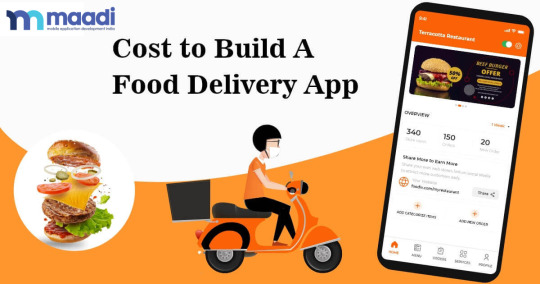
#food delivery app#Food Delivery App Costs#business#app development costs#mobile app#india#Android#iOS
1 note
·
View note
Text

Simplifying UI/UX Design in Mobile App Development
The Significance of UI/UX Design
1. Enhancing User Engagement
A captivating UI/UX design is a magnet for user interest, offering an inviting interface that encourages repeated interactions. It reduces learning curves and fosters positive emotions, prompting users to return for more.
2. Improving User Retention
The pivotal role of UI/UX design in boosting user retention cannot be overstated. A well-designed interface ensures a positive user experience, minimizing the chances of users abandoning the app due to complexity or confusion.
3. Boosting App Downloads
The visual appeal and user-friendliness of an app’s interface directly impact download numbers. An attractive UI can entice potential users to explore and download the application, while poor design might drive them away.
4. Increasing Revenue
UI/UX design profoundly influences the revenue generated by mobile apps. A well-crafted interface enhances user experience, increasing the likelihood of in-app purchases and premium feature subscriptions.
5. Creating Brand Awareness
UI/UX design contributes significantly to brand perception. A visually appealing and user-friendly interface leaves a positive impression, fostering brand recognition and increasing the likelihood of user recommendations.
UI Design Elements for Mobile Apps
1. Navigation
Simple and intuitive navigation ensures users can effortlessly explore the app, enhancing their overall experience.
2. Consistency
A consistent design language, including typography and colors, fosters familiarity and improves user comprehension across the app.
3. Typography
Carefully selected font sizes, typefaces, and colors ensure legibility on mobile devices, contributing to an accessible and visually appealing user interface.
4. Visual Elements
Engaging visual elements, such as icons and illustrations, enhance user experience and contribute to the overall attractiveness of the app.
5. User Feedback
Providing timely feedback through sounds, animations, or tactile responses helps users understand actions, creating a sense of involvement.
6. Gestures
Simple and user-friendly gestures, such as swiping or tapping, contribute to a natural and intuitive interaction experience.
UX Design Elements for Mobile Apps
1. Simple and Intuitive Navigation
An easily navigable menu enhances the overall user experience, ensuring users can effortlessly move between app sections.
2. Friendly User Interface
A friendly and inviting interface, simple to navigate with clear instructions, contributes to a positive user experience.
3. Consistency in Design
A uniform design across all app screens enhances familiarity, making it easier for users to interact with the application.
4. Fast Loading Times
Swift loading times are essential for preventing user frustration and abandonment, optimizing the overall user experience.
5. Personalization
Tailoring the app to user preferences increases engagement and loyalty, contributing to an enhanced user experience.
6. Feedback and Error Messages
Providing precise feedback helps users understand actions and errors, creating a more transparent and engaging user experience.
7. Accessibility
Designing with accessibility in mind ensures the app is usable by all, irrespective of abilities, contributing to a more inclusive user experience.
The Importance of User Testing
User testing is a vital phase in UI/UX design, offering insights into user behavior and preferences. By identifying design flaws, usability issues, and gathering valuable feedback, user testing ensures the creation of user-friendly and effective mobile apps.
1. Enhances User Experience
Observing user interactions helps identify points of confusion, enabling adjustments to improve the overall user experience.
2. Identifies Design Flaws
User testing reveals design weaknesses that might not be immediately apparent, allowing for early adjustments and preventing costly revisions later on.
3. Saves Time and Money
Early identification of issues during user testing helps avoid expensive revisions post-launch, ultimately saving both time and money.
4. Increases User Engagement
By understanding how users interact with the app, designers can tailor features to preferences, enhancing user engagement and increasing retention.
5. Provides Valuable Feedback
User testing provides direct feedback from users, aiding designers in making informed decisions and improving the overall user experience.
Final Thoughts on UI/UX Design in Mobile App Development
In summary, UI/UX Design in Mobile App Development is not merely a nicety but a fundamental component of successful custom mobile app development. A well-crafted UI/UX Design in Mobile App Development enhances user experience, increases engagement, boosts retention, and contributes to revenue growth. It is imperative for developers to invest in UI/UX Design in Mobile App Development to set their mobile applications apart, meet user demands, and ensure long-term success in the competitive mobile app market.
Get in touch with AppYard Technologies now and elevate your business to new heights.
Website: https://appyard.co.in/
Medium: https://medium.com/@bhagyashrie1/top-website-design-trends-for-2024-f121c5d8f059
Blogger: https://appyardservice.blogspot.com/
Instagram: https://www.instagram.com/appyardofficial/
LinkedIn: https://www.linkedin.com/company/appyard/
#UI/UX Design in Mobile App Development#UI/UX Design#Mobile App Development#Affordable UI/UX development in India#App Design#App Development Company#App Development Costs
1 note
·
View note
Text
Decoding App Development Costs in India: What to Expect
Embarking on the journey of app development is an exciting venture, but one that often comes with questions about costs. In India, where the tech industry is thriving, understanding how much an app developer charges is crucial for planning and budgeting. In this guide, we’ll delve into the factors influencing app development costs and provide insights into what you can expect when hiring an app…
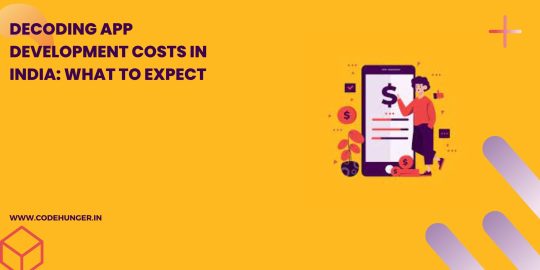
View On WordPress
#Android app development#App Design Costs#App Developer Charges#App Development Agencies#App Development Budget#App Development Costs#App Development Process#App Maintenance Costs#Complex App Development#Cross-Platform App Development#Custom App Development#Digital Innovation Costs#Freelance App Developers#Indian App Developers#Indian Tech Industry#iOS App Development#Mobile App Cost Estimation#Mobile App Investment#Mobile App Market in India#Mobile App Pricing
0 notes
Text
flight rising needs a mobile app so badly and any time someone tries to suggest it in their forums a swarm of joyless gatekeepers explain condescendingly how it's too much resources. and it's like having the game easily portable with a interface actually meant for my phone is infinitely more exciting than a new type of dragon or familiar rollout I don't mind if it takes a lot of resources if it makes daily play of the game feasible for people who don't have infinite time at an unfirewalled computer
#flight rising#i also think they would make back whatever money it costs to develop especially if they make a 1x premium adless option accompanied by gems#didn't think I'd have to say this but it's completely normal go expect they'd finish a mobile site before an app#and every other website that has shifted to an app also has a mobile view in browser with zero exceptions I can recall
22 notes
·
View notes
Text
How to Choose The Right HubSpot Partner? - A compressive Guide
For more visit Our Blog,
Elite HubSpot Agency Partner
Custom On-demand software solutions
Hire Android developer
Hire IOS developer
#app development#ios application development services#app development cost#ev charging app#evcharging#ev charging station market#ev charging station finding app development#hire ios developers#hire android developer#hire dedicated developer#crm integration#hubspot services#hubspot elite partner
2 notes
·
View notes
Text

#food delivery app development#food delivery app development cost#on demand app development company#food ordering app development#food ordering app solutions
4 notes
·
View notes
Text
The Impact of Blockchain Technology on Mobile App Development Companies

Blockchain is still a relatively recent technology that has really disrupted the technological landscape and brought in innovations that are seismic in their impact. Due to its decentralized and democratic nature, as well as its safety and non-flammability, this is a perfect technology that may change one or another industry, and the sphere of mobile application development is no exception. With each passing day, mobile app development companies are striving to think out of the box by coming up with new innovations, and incorporating blockchain technology is believed to be on the brink of revolutionizing how each firm works and provides services to its clients.
Understanding Blockchain and Its Advantages
Before delving into the impact of blockchain on mobile app development companies, it's essential to understand what blockchain technology is and its inherent advantages. Blockchain is a decentralized, distributed digital ledger that records transactions in a secure and immutable manner. Each block in the chain contains a cryptographic hash of the previous block, creating a tamper-proof data chain.
Some of the critical advantages of blockchain technology include:
Decentralization: Blockchain eliminates the need for a central authority, allowing for peer-to-peer transactions and data sharing.
Transparency: All transactions on a blockchain network are visible to all participants, ensuring transparency and accountability.
Security: Blockchain leverages advanced cryptography techniques, making altering or manipulating data once it's recorded on the blockchain nearly impossible.
Immutability: Data recorded on the blockchain is immutable, meaning it cannot be altered or deleted, ensuring data integrity.
Enhancing Data Security and Privacy
One of the most significant impacts of blockchain technology on mobile app development companies is data security and privacy. With increasing concern over data breaches and privacy violations, blockchain offers a secure and transparent solution for managing sensitive user data.
Mobile app development companies can leverage blockchain to create decentralized applications (DApps) that store user data on a distributed ledger, eliminating the need for centralized servers prone to hacking attempts. By distributing data across multiple nodes in the blockchain network, companies can significantly reduce the risk of data breaches and ensure the privacy of user information.
Furthermore, blockchain-based mobile apps can give users complete control over their personal data, granting or revoking access to specific data as they see fit. This empowers users and fosters trust in the mobile app development company, as data security and privacy are prioritized from the ground up.
Streamlining Processes and Reducing Costs
Beyond data security and privacy, blockchain technology can streamline various processes within app development companies, increasing efficiency and cost savings. One example is smart contracts, which are self-executing contracts with the terms of the agreement directly written into code.
Mobile app development companies can leverage smart contracts to automate various aspects of their operations, such as project management, billing, and payment processing. Smart contracts eliminate the need for intermediaries, reducing overhead costs and increasing transparency throughout the development process.
Blockchain-based mobile apps can also facilitate peer-to-peer transactions, enabling direct interactions between developers, clients, and other stakeholders. This disintermediation can significantly reduce transaction fees and streamline payment, benefiting the mobile app development company and its clients.
Fostering Trust and Transparency
In the highly competitive world of mobile app development, building trust and maintaining transparency are crucial for success. Blockchain technology can potentially revolutionize how mobile app development companies establish trust and transparency with their clients.
By leveraging blockchain's immutable and transparent nature, app development companies can provide clients with a comprehensive audit trail of the development process. Clients can access real-time updates on project milestones, code changes, and resource allocation, fostering a sense of trust and accountability.
Furthermore, blockchain-based mobile apps can incorporate reputation systems, where users can leave verifiable feedback and ratings for developers or app development companies. This transparency in feedback can help clients make informed decisions when choosing a custom mobile app development company and encourage companies to maintain high-quality standards.
Unleashing New Business Models
Blockchain technology has paved the way for new and innovative business models in the mobile app development industry. One such model is the decentralized application (DApp) marketplace, where developers can showcase and monetize their blockchain-based mobile apps.
Mobile app development companies can leverage these decentralized marketplaces to reach a global audience and tap into new revenue streams. By creating and deploying DApps on blockchain networks, companies can offer unique and innovative solutions that prioritize user privacy, security, and transparency.
Moreover, blockchain technology enables the creation of tokenized ecosystems, where digital tokens can represent various assets or services within a mobile app. Mobile app development can explore tokenization models to incentivize user engagement, reward developers, and facilitate micro-transactions within their applications.
Challenges and Considerations
That said, demonstrating and elaborating on the opportunities that Blockchain technology brings to the mobile app development companies, it is also necessary to note some concerns related to the employing of the technology. First, it is the problem of scalability since blockchain solutions may face limits in terms of transaction rates and may need optimization for complex mobile traffic of large applications.
Furthermore, the novelty of the blockchain allows it to be seen as a complex technology that requires standardization so as to be fit for use in the mobile application development industry. Addressing these issues brings us to the conclusion that incorporating blockchain solutions needs specialized knowledge and experience and may lead to the retraining of current developers or the appointment of blockchain specialists solely.
Additionally, legal issues and risks may arise from lack of clear laws and regulations governing blockchain technology and cryptocurrencies, which hinders the app development process. By doing so companies are able to position themselves to effectively monitor changes occurring in the environment and respond to them in ways that would help them meet legal requirements and also minimize risks in such a dynamic environment.
Conclusion
Needless to say, the application of blockchain technology within mobile app development companies is tremendous. Beyond the ability to increase data protection or attitude towards privacy, blockchain provides a great value proposition to corporations that want to adapt to the constantly advancing environment.
Ensuring that the markets and customers require more secure, efficient, and decentralized solutions, mobile application development firms adopting blockchain technology will be perfectly positioned to seize opportunities and meet their clients’ requirements.
Nonetheless, it is crucial to establish that companies need to keep a number of considerations in mind while implementing blockchain business solutions. Establishing effective ways for training employees, being aware of the activities of the legislative authorities, and partnering with specialists from different departments can reduce potential risks and achieve proper use of new technologies.
In conclusion, blockchain will be explained in detail, highlighting its potential to revolutionise mobile app functioning and the benefits it will bring to app developers and their clientele. Companies eager to embrace this groundbreaking advancement stand to gain the upper hand in the continually changing mobile app market.
#mobile app development#mobile app development company#mobile app development companies#app development cost#blockchain#blockchain technology
1 note
·
View note
Text
How to Build a Zomato Clone App: A Step-by-Step Guide

Building a successful food delivery app like Zomato requires careful planning and execution. With the growing demand for convenient and seamless food delivery services, developing a Zomato clone app can be a lucrative business opportunity. In this step-by-step guide, we will walk you through the process of building your own Zomato clone app, from market research and design to development and launch.
Whether you are an aspiring entrepreneur or an existing restaurant owner looking to expand your business, this guide will provide you with all the information you need to create a successful food delivery app and tap into the booming food delivery industry.
Here's a step-by-step guide to help you build a Zomato-like app:
Market Research
Understand your target audience and market. Analyze Zomato and other similar apps to identify features and functionalities.
Legal Compliance
Check local laws and regulations related to food delivery and online platforms. Obtain necessary licenses and permissions.
Define Features
List the features you want in your app, such as user registration, restaurant listing, menu display, reviews, ratings, order placement, payment processing, etc.
Choose Technology Stack
Select the technology stack for your app (front-end and back-end frameworks, database, etc.).
Wireframing and Design
Create wireframes to outline the app's structure. Design the user interface (UI) and user experience (UX).
Backend Development
Set up the server and database. Implement user authentication, authorization, and data storage.
Frontend Development
Based on the design, create the user interface. Implement features like user registration, restaurant listing, menu display, and order placement.
Integrate Maps and Location Services
Use mapping APIs to provide location-based services for finding restaurants and tracking deliveries.
Implement Search and Filters
Allow users to search for restaurants based on various criteria like cuisine, location, ratings, etc.
User Reviews and Ratings
Implement an application for users to submit restaurant reviews and ratings.
Order Placement and Checkout
Develop a seamless and secure process for users to place orders and make payments.
Notifications
Set up push notifications to keep users informed about order status, promotions, etc.
Payment Integration
Integrate secure payment gateways for seamless transactions.
Testing
Perform extensive testing to investigate and fix bugs. Check out the app on different devices and screen sizes.
Deployment
Launch the app to the App Store and Google Play Store.
Monitor and Maintain
Monitor app performance and address any issues promptly. Maintain the app's security patches.
Building a Zomato clone app requires a strategic approach, technical proficiency, and a commitment to delivering an outstanding user experience. By combining these factors, you can create a successful food delivery and restaurant discovery app that captivates users and establishes a strong presence in the competitive market.
What is a Zomato Clone App? & How it Works!
A Zomato clone app is a customized application that replicates the features and functionalities of the popular food delivery and restaurant discovery platform, Zomato. Creating a Zomato clone allows entrepreneurs and businesses to enter the food delivery and restaurant aggregator market with their version of a similar service.
Here's an overview of how a Zomato clone app typically works:
User Registration and Profile Creation
Users download the Zomato clone app from an app store. They register by providing basic details or logging in through social media accounts. Users create profiles where they can manage their preferences, addresses, and payment methods.
Restaurant Profiles
Users can view detailed profiles of restaurants, including menus, prices, operating hours, reviews, and ratings.
Order Placement
Users can select items from the restaurant's menu and add them to their cart. They proceed to checkout, where they confirm the order, select the delivery address, and choose a payment method.
Payment Processing
The Zomato clone app integrates with secure payment gateways to process transactions. Users can make payments using various methods, including credit/debit cards, digital wallets, and sometimes cash on delivery.
Order Confirmation
Users receive an order confirmation with details such as estimated delivery time and order number. The app may also provide real-time tracking of the order's status.
Delivery or Pickup
For food delivery, a delivery partner is assigned to pick up the order and deliver it to the specified address. Users can track the delivery in real-time. For pickup, users receive a notification when the order is ready for collection.
User Feedback and Ratings
After the order is delivered or picked up, users can provide feedback and ratings on the overall experience.
Admin Dashboard
An admin dashboard allows the platform owner to manage and monitor user activity, restaurant partnerships, and overall app performance. It also provides tools for customer support and analytics.
Marketing and Promotions
The Zomato clone app may incorporate features for promotional activities, discounts, and loyalty programs to attract and retain users.
Building a Zomato clone involves careful consideration of each feature and ensuring a seamless user experience throughout the entire process, from restaurant discovery to order delivery or pickup. Integration with reliable payment gateways and real-time tracking contributes to the overall success and user satisfaction of the app.
Benefits of Developing a Zomato Clone App
Developing a Zomato clone app offers a myriad of benefits, leveraging the success of an established food delivery app and restaurant discovery platform. Here are key advantages that contribute to the appeal of creating a Zomato clone:
Rapid Market Entry and Brand Recognition
Building a Zomato clone facilitates a swift entry into the competitive food delivery market. By replicating a proven business model, your app gains immediate brand recognition. Users familiar with Zomato are more likely to adopt your platform, accelerating user acquisition.
Comprehensive Feature Set
Zomato is renowned for its comprehensive feature set, including restaurant listings, reviews, ratings, real-time tracking, and secure payment options.
Established User Base
A Zomato clone can attract users who are already accustomed to using similar platforms. This existing user base provides a solid foundation for user engagement and adoption, giving your app a head start in terms of audience reach.
Monetization Strategies
Zomato has established effective monetization strategies, such as charging restaurants a commission on orders and offering premium features. By adopting these proven revenue models, your app can generate income from day one.
Time and Cost Efficiency
Developing a Zomato clone is a time-efficient and cost-effective approach compared to building a unique concept from scratch. Reusing existing concepts and technologies reduces development time and expenses.
Scalability Options
As your user base grows, a Zomato clone provides scalability options. You can expand your infrastructure and services to accommodate increased demand, ensuring a seamless experience for users.
Developing a Zomato clone app offers a strategic and efficient path to enter the food delivery and restaurant discovery market, leveraging the success and features of a proven industry leader.
Features of the Zomato Clone App
A Zomato clone app replicates the features of the popular food delivery and restaurant discovery platform, offering a comprehensive set of functionalities to create a similar user experience. Here are key features typically incorporated into a Zomato clone app:
User Registration and Profiles
The app allows users to create accounts easily, providing personal information, contact details, and preferences. User profiles enable customization, order history tracking, and personalized recommendations.
Restaurant Listings and Profiles
A Zomato clone showcases a wide array of restaurants, each with detailed profiles. Users can explore menus, view prices, check operating hours, and access high-quality images, empowering them to make informed dining decisions.
Search and Filters
Robust search and filter options enhance user experience. Users can search for restaurants based on cuisine, location, ratings, and price range, ensuring they find exactly what they're looking for.
Ordering System
The app features a user-friendly ordering system where users can add items to their cart, customize orders, and proceed to secure checkout. Integration with various payment options facilitates seamless transactions.
Real-Time Order Tracking
To keep users informed and engaged a Zomato clone script incorporates real-time order tracking. Users can monitor the status of their orders from preparation to delivery, enhancing transparency and customer satisfaction.
Integration of Payment Gateway
A secure payment gateway is integrated into the app to handle financial transactions. Users can make payments using credit/debit cards, digital wallets, or other preferred methods, ensuring a smooth and secure payment process.
Admin Dashboard
An admin dashboard provides a centralized interface for platform administrators to manage user accounts, monitor restaurant activity, analyze performance metrics, and address customer support issues.
Marketing and Promotions
To attract and retain users, a Zomato clone may feature marketing and promotional tools. These can include discounts, loyalty programs, and special offers to enhance user engagement.
Order Fulfillment and Delivery Integration
For apps offering food delivery services, integration with order fulfillment and delivery services is crucial. Assigning delivery partners, optimizing routes, and providing real-time tracking contribute to a seamless delivery experience.
Customization for Local Markets
A Zomato clone allows customization to meet the unique demands of local markets. It includes adapting the app's features and functionalities to align with regional preferences, cuisines, and cultural nuances.
A Zomato clone app combines these features to create a comprehensive platform for users to discover restaurants, place orders, and enjoy a seamless dining experience.
What Should You Consider While Developing a Food Delivery App Like Zomato?
When developing a food delivery app like Zomato, several critical factors need consideration:
Market Research
Conduct thorough market research to understand user demographics, preferences, and competitor strategies. Identify gaps and opportunities in the market.
User Experience (UX/UI)
Prioritize an intuitive and visually appealing interface. Streamline the user journey, making it easy for users to discover restaurants, place orders, and track deliveries.
Feature Set
Replicate Zomato's core features, including restaurant listings, user reviews, ratings, real-time order tracking, and secure payment options. Enhance these features to add value and differentiation.
Customization for Local Markets
Adapt the app to cater to local culinary preferences, languages, and cultural norms. Personalization for different regions enhances user relevance.
Payment Gateway Integration
Integrate reliable and secure payment gateways, offering users diverse and convenient payment options.
Legal Compliance
Ensure strict adherence to data security and privacy regulations. Address legal considerations to build user trust.
Marketing and Promotion
Develop a strategic marketing plan to promote the app effectively. Leverage various channels for user acquisition and engagement.
Customer Support
Implement responsive customer support to address user queries promptly, enhancing overall user satisfaction.
By carefully considering these aspects, a food delivery app can be developed to meet user needs and succeed in a competitive market.
Wrapping up
Building a Zomato clone app requires meticulous planning, incorporating key features, ensuring a user-friendly interface, and prioritizing local customization. By embracing the proven success of platforms like Zomato, developers can create a comprehensive food delivery app that caters to market demands and offers a seamless dining experience for users.
#zomato clone app#zomato clone#zomato clone script#food ordering app#food delivery business#food delivery services#food delivery app#best food delivery software#best online food ordering system#white label food delivery app#online food delivery app development#food delivery app development company#food delivery app development cost#online food delivery services#food delivery app like zomato#zomato clone app development
2 notes
·
View notes
Text

Top 5 Skills Required for a Mobile Application Developer
Discover the top 5 skills that every aspiring mobile application developer should possess to excel in this fast-paced and dynamic industry.

Mobile applications have become an integral part of our lives, revolutionizing the way we communicate, work, and entertain ourselves. As the demand for innovative and user-friendly mobile apps continues to grow, so does the need for skilled mobile application developers. If you’re aspiring to build a career in this exciting field, it’s essential to equip yourself with the right set of skills. In this article, we will explore the top 5 skills that every mobile application developer should possess to stay ahead of the game.
Headings:
Proficiency in Programming Languages
User Interface (UI) and User Experience (UX) Design
Cross-Platform Development
Knowledge of Mobile App Development Frameworks
Problem-Solving and Debugging Skills
Proficiency in Programming Languages:
To become a proficient mobile application developer, you must have a strong foundation in programming languages such as Java, Swift, or Kotlin. These languages are widely used in developing mobile apps for different platforms like Android and iOS. Understanding the syntax and structure of these languages will enable you to write efficient and bug-free code, ensuring the smooth functioning of your mobile applications.
User Interface (UI) and User Experience (UX) Design:
Creating visually appealing and user-friendly interfaces is crucial for the success of any mobile application. As a mobile application developer, you need to have a good understanding of UI and UX design principles. This includes knowledge of color schemes, typography, layout design, and navigation patterns. By incorporating intuitive and engaging design elements, you can enhance the overall user experience and make your app stand out from the competition.
Cross-Platform Development:
With the increasing popularity of multiple operating systems, it’s essential for mobile application developers to have expertise in cross-platform development. Cross-platform development allows you to build applications that can run seamlessly on different platforms, such as Android and iOS, using a single codebase. Frameworks like React Native and Flutter have gained significant traction in the industry, enabling developers to write code once and deploy it across multiple platforms, saving time and resources.
Knowledge of Mobile App Development Frameworks:
Mobile app development frameworks provide developers with a set of tools and libraries to streamline the development process. Familiarity with frameworks like Android Studio, Xcode, and Xamarin can significantly enhance your productivity and enable you to build robust and feature-rich applications. These frameworks offer a wide range of pre-built components, APIs, and debugging tools that simplify the development workflow and allow you to focus on creating innovative functionalities.
Problem-Solving and Debugging Skills:
Mobile application development is not without its challenges. As a mobile application developer, you must possess strong problem-solving and debugging skills to identify and fix issues that may arise during the development process. Being able to analyze and debug code efficiently will help you eliminate bugs, optimize performance, and ensure that your applications deliver a seamless user experience.
Wrap-up:
Becoming a successful mobile application developer requires a combination of technical expertise, creativity, and a passion for innovation. By mastering the top 5 skills mentioned above, you can position yourself as a sought-after professional in the mobile app development industry. Remember, continuous learning and staying updated with the latest trends and technologies will be key to your success in this ever-evolving field.
Get in touch with AppYard Technologies now and elevate your business to new heights.
Website: https://appyard.co.in/
Medium: https://medium.com/@bhagyashrie1/top-website-design-trends-for-2024-f121c5d8f059
Blogger: https://appyardservice.blogspot.com/
Instagram: https://www.instagram.com/appyardofficial/
LinkedIn: https://www.linkedin.com/company/appyard/
#Mobile Application#app development#App Development Company#App Development Services#App Development Cost#App Development Costs#App Design#Custom App development India
0 notes
Text

With a web app development virtual assistant committed to your company, you can turn website visitors into customers, develop your own apps, and maintain the security and updates of your website. Pankh Consultancy Pvt. Ltd provide a broad range of virtual assistant support services in the areas of digital marketing, branding, web development, mobile development, and design and strategy consulting. Contact Now ! +1 (646-609-7473)
#web app development virtual assistant#graphic designer virtual assistant#mobile development virtual assistant#financial accounting virtual assistant#seo specialist virtual assistant#ppc specialist virtual assistant#social media manager virtual assistant#digital marketing virtual assistant#cost accounting virtual assistant#software development virtual assistant#top-rated virtual assistants worldwide
1 note
·
View note
Text
What Factors Affecting Android App Development Cost in Australia

As of 2024, the cost of developing Android apps in Australia may vary based on project complexity and features. Generally, simple apps can start from AUD 5,000 to AUD 15,000, while more complex apps with advanced functionalities may range from AUD 20,000 to AUD 50,000 or higher. Factors influencing costs include design intricacy, development time, desired features, and post-launch support. It's crucial to collaborate with experienced developers and consider ongoing maintenance expenses. Keep in mind that these figures are estimates, and individual project requirements will ultimately determine the final cost of Android app development in Australia.
#Android App Development Cost#App Development in Australia#app development services#app development company#Android App Development#ios app development#marketing#app development#mobile app development company#mobile app development#melbourne#australia
1 note
·
View note
Text
Transform Your Laundry Business with Custom On-Demand App Solutions
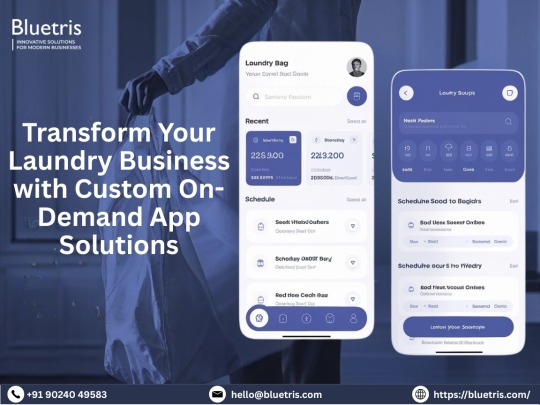
Looking to upgrade your laundry or dry-cleaning operations? Bluetris Technologies offers On-Demand Laundry App Development tailored to automate pickups, delivery, and order workflows—driving customer satisfaction and operational efficiency.
Our web and mobile apps feature real-time tracking, payment integration, order history, and delivery management, all built using Flutter, Node.js, Firebase & AWS to ensure scalability and performance.
🧼 Key Features: ✅ Pickup Scheduling & Slot Booking ✅ Order Tracking & Live Notifications ✅ UPI, Wallet & Card Payment Support ✅ Ratings, Reviews & Chat Support ✅ Admin Panel with Revenue Insights ✅ Staff & Delivery Workflow Management
📞 Take your laundry business digital today. 📱 +91-90240 49583 | 🌐 www.bluetris.com
#mobile app development company#mobile app development#mobile app development cost#on-demand app development#mobile application development#laundry app development cost#laundry app features#laundry app development company#laundry app development
0 notes
Text
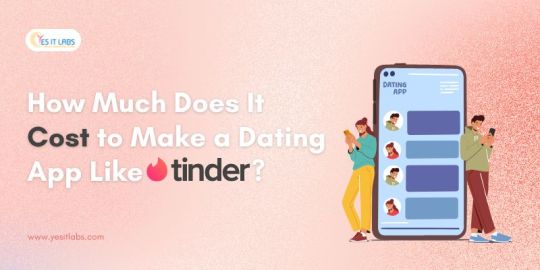
How Much Does It Cost to Make a Dating App Like Tinder?
Understand the critical elements and cost structure for developing a dating app like Tinder—from prototyping to deployment.
#Android App Development Company#Android App Development Company in usa#app development company in usa#app development company usa#Cost to Make a Dating App Like Tinder#Build Dating App Like Tinder
0 notes